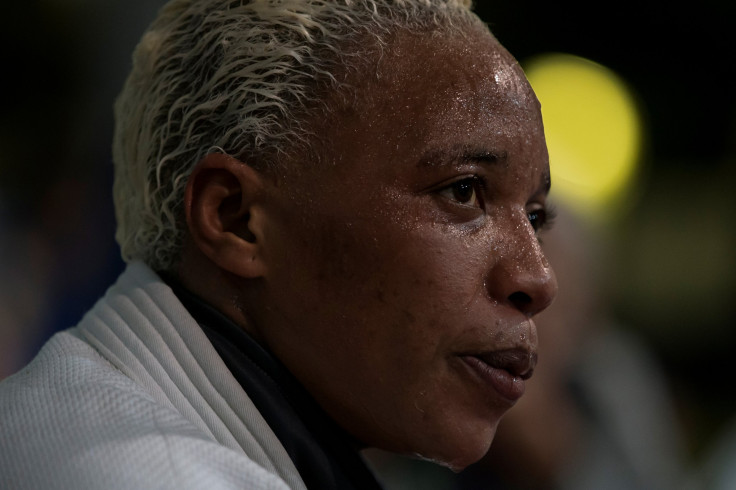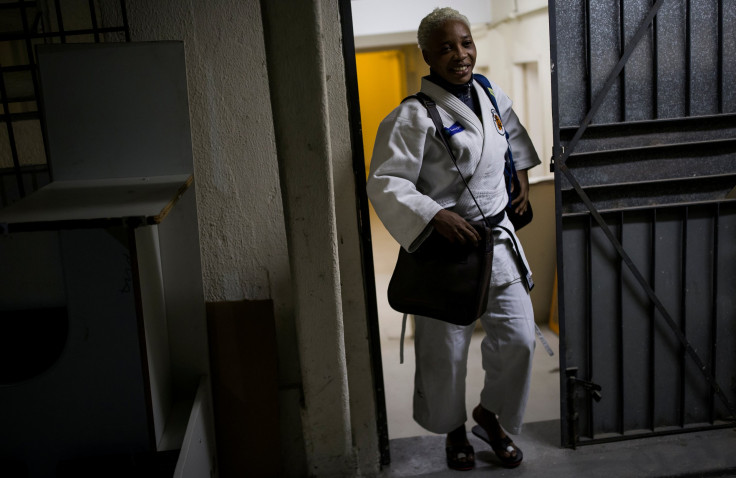Rio Olympics 2016: Win Or Lose, There's One Athlete For The World To Pull For

Olympic spectators can put their national pride and biases aside Wednesday morning. We can all pull for our countries another time.
When the women’s judo round of 32 begins for the 70-kilogram division, there will be one Olympian who will stand out among the rest.
The story of Yolande Bukasa Mabika, one of 10 members of the Refugee Olympic Team, tests the limits of the human spirit and embodies all that is great about the Olympics. The 29-year-old’s journey awakens our consciousness, forcing introspection on how most everyday problems are often remarkably insignificant.
Mabika’s story begins in the Democratic Republic of Congo. When she was 10 years old she was separated from her family during the Congolese civil war, which began in 1998 and ended in 2003. She was transported by helicopter from eastern Congo to the capital of Kinshasa, where she was put in a children’s home.
She has not seen her parents or siblings since.
It was in the center for displaced children where she turned to judo, training for 15 years amid constant danger. Mabika would become quite good at judo, a martial art that helped her overcome childhood trauma.
“Judo is my life. It helped me escape war, to take another path,” Mabika said.
Mabika would eventually become a member of the Congo judo team. But she and other members were subjected to terrible abuse from team leaders after losing tournaments and on a visit to Rio de Janeiro for the 2013 World Judo Championships she was subjected to another humiliation.
Her money and passport were taken from by team officials and after being deprived of food for days before her fight. Mabika had no choice but to take action. Enough was enough.
Left with no other options and seeking a meal, she left her hotel to wander the streets of a country she didn’t know and without speaking a word of Portuguese.
Lost, penniless, and crying for help, her problems weren’t going away. Life in Rio would be yet another challenge for Mabika to overcome.
She would later seek asylum in Brazil with the help of a Catholic charity, Cáritas, and couch surfed upon settling in Bras de Pina, an area of northern Rio surrounded by dangerous favelas. While her new home may at first seem like an improvement over the brutal conditions she faced in the Congo, Mabika claims there was “no difference” from the violence seen in her new neighborhood compared to what she saw in the Congo. It’s as though she went from one war zone to another.
With no family, no education and no money she turned to a neighborhood church that included other Congolese refugees and with Sunday masses conducted in both Portuguese and her native tongue Lingala. She would also take odds jobs to survive.
Meanwhile, Mabika continued to pursue judo, with hopes of achieving her Olympic dream. Even before qualifying for the Olympics, she was determined to thrive at judo. The sport was used as a way to escape her tortured past and build a better future.
“Judo has given me inner strength and toughened me up,” she told reporter Philipp Barth in May. “It helps me forget about my problems.
“When I am competing there is no room in my head for sorrow.”
Things eventually started looking up for Mabika.
She began training at a judo school founded by Flavio Canto, a Brazilian Olympic bronze medalist at the 1984 Athens Games, and is mentored by four-time Brazilian Olympic judo coach Geraldo Bernardes. The sessions are in sharp contrast from her days of mistreatment and punishment by her Congolese coaches. She improved at judo, and while she is not ranked in the top 10 in her weight class she has a decent chance of advancing from the early rounds.
Mabika also received a helping hand from the International Olympic Committee (IOC) with a stipend pf $1,500 a month for a year, and now has an apartment and a bed – two things she hasn’t had in several years.
Her judo success has also helped her become somewhat of a neighborhood celebrity, and the locals will be cheering her on when she makes her Olympic debut against Israel’s Linda Bolder. Mabika is confident she’ll succeed at Rio 2016.
“I will be part of this team and I will win a medal. I am a competitive athlete, and this is an opportunity that can change my life,” she said in a June article posted on the UN Refugee Agency’s website.

Mabika is one of 24 competitors in the division seeking a medal. It won’t be a walk in the park to advance to the medal round, but nothing in her life has ever been easy.
Because of her talent in judo, she has at least come this far. Most refugees aren’t so lucky. Violence around the globe has forced 60 million people to find a new place to live and Brazil is home to 8,500 refugees. Many are stranded and feeling desolate after wars and political upheaval.
For Mabika, the opportunity to compete in the Olympics provides her with the unique chance to perhaps reunite with her family.
“I will fight at the Olympics so I can change my life,” Mabika told USA Today in July. “Maybe I can find my family and bring them here. If they see me on television, my message is that I miss them a lot. I really want to be able to see them again.”
That’s why every fan of Olympic competition should be supporting Mabika. She’s fighting for so much more than Olympic glory. She offers hope to all those who don’t have that chance. Her inspirational journey transcends borders.
“I cannot fight for my country. I will fight for the Olympics. I will fight for all refugees in the world, to defend all refugees in the world,” Mabika said.
© Copyright IBTimes 2024. All rights reserved.






















